It is one of the most ambitious regeneration schemes in London - and also one of the most controversial. In the past few months, plans by developer Renewal to redevelop a 2.5m sq ft chunk of land surrounding Millwall Club in south-east London have hogged the headlines.
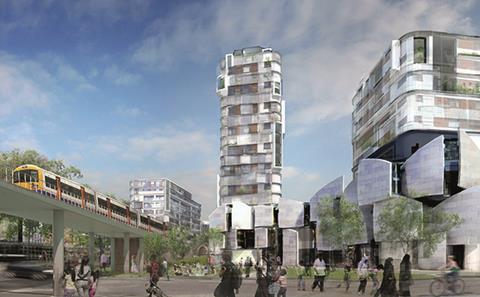
Now the £1bn scheme, christened New Bermondsey, has temporarily been put on hold as Lewisham council undertakes an investigation into a compulsory purchase order (CPO) that it scrapped in late January and would have allowed Renewal to piece together the final parts of the land jigsaw around the stadium, including three pieces of land currently occupied by the football club.
Over the last few months, Renewal has maintained what founder and director Mushtaq Malik describes as a “dignified silence”. But now, he says, in a frank, wide-ranging interview at the company’s head office, which overlooks Millwall’s New Den stadium, such a silence “no longer works for us”. Property Week has also spoken to Steve Kavanagh, chief executive of Millwall FC, to get the football club’s side of the story.
All major developments tend to undergo a pretty tortuous journey from start to completion, but Renewal’s plans to create New Bermondsey have been more dogged by challenges than most.
We’ve maintained a dignified silence for the past few months, but that no longer works for us - Mushtaq Malik, Renewal
The developer first submitted planning permission for the scheme in January 2011, which was approved by Lewisham council in March 2012.
However, to complete the development jigsaw, it needed to acquire a couple of further parcels of land including a car park used by the football club, the site of the Millwall Community Trust and the club’s café.
So it pushed for a CPO, which was initially approved by the council’s cabinet in September 2016. Then, in late January, the council abandoned the CPO and said that the original CPO decision “has no force and cannot be implemented”. Any regeneration of the area, proposed by any party, would require a “completely new and fresh” decision by the council.
Having already spent six years on a project, such a setback would get most people down, but not Malik, who is all too familiar with the machinations of the property industry. Although he is a relative unknown in UK property development circles, property is in his blood - he comes from a family of landowners and “real estate people” in India. After leaving university, he had a brief stint in retail and manufacturing and then, in the early 1990s, got a job as a senior officer in the services team at Lewisham council.

After leaving the council in 1995, he set up his own outsourcing company, ServiceTeam, which sold services to local authorities around the country. His experience working with the public sector spurred him on to redevelop the Lewisham site. In the ’90s, Malik saw “major change” occurring up and down the country.
“Canary Wharf - that is where regeneration started,” says Malik, staring at the Wharf’s towers through the boardroom window. “For me, it was a huge inspiration - from a Canadian company nobody had ever heard of, Olympia & York.
People say: ‘Who’s Renewal?’ Well, who were Olympia & York? Nobody had ever heard of them. But the company had the vision and the force to do a regeneration of this scale. That’s the motivation behind this and that’s why we started to assemble this land, in order to change it. I know this area, I’ve grown up here and it’s where I spent my formative years.”
Malik sold ServiceTeam in 2001 and used the funds to start buying land and property. He bought lots of sites in the South East - the first development entailed converting a double-glazing factory into seven townhouses.
“We would usually get our exit by doing a joint venture with a builder or a housing association,” he recalls. “We are not housebuilders. The most risky thing to do is to buy unconsented land with your own equity.”
So he was taking a major gamble when he started assembling the site around the stadium in 2003. Today, the Renewal group and its many subsidiaries own 71 properties - 70 in Lewisham and an office building in Greenwich.
In total, the developer says it has accumulated more than 500,000 sq ft of space and the bulk of these properties are industrial units surrounding the stadium.
Regeneration vision
If fully developed out, the site would boast 2,400 new residential units as well as community sports facilities, an integrated health centre, a home for Hillsong Church, business incubation space and a creative industries hub.
The area was zoned for housing by the Greater London Authority in February 2015 and the plan was greeted with open arms by then London mayor Boris Johnson, who spoke about a regeneration project that would “turbo-boost the transformation of the capital’s brownfield sites”.
Timeline: New Bermondsey
1993 Millwall FC moves to the New Den in Lewisham
1995 Mushtaq Malik leaves Lewisham council to set up ServiceTeam
2002 Malik and David Sullivan sell ServiceTeam and create Renewal
2003 Renewal buys first parcels of land around the stadium
2006 Renewal approaches Lewisham to re-designate the brownfield site to mixed-use
2007 Sullivan leaves Renewal
2011 Renewal submits planning application to Lewisham council
2011 Renewal and Lewisham create the Surrey Canal Sports Foundation (SCSF) to raise money for a sports village
2012 Lewisham approves Renewal’s planning application
2015 The GLA gives the scheme a £20m loan and grants it housing zone status
2016 A CPO for the land Renewal needs to complete the development jigsaw is approved by 6-1 by the council in September
2017 In January, the council withdraws the CPO and opens an investigation into SCSF and the New Bermondsey CPO
Malik estimates he has spent “tens of millions” on assembling freehold property interests in the area, although he won’t be drawn on the exact figure. “It’s inappropriate for us to point out figures because we have some important deals coming up,” he says.
These deals surround the missing pieces of the jigsaw - the so-called ‘ransom strips’. “We have paid on average 20% to 30% above market value and we will continue to do so,” says Malik. “The people remaining now, they don’t want that; they want 10 to 50 times the value. One of these units is worth maybe £60,000 but the person wants £600,000. If you start doing that it’ll never stop.”
The other major obstacle Renewal has had to overcome is the football club itself. Malik says he has no argument with Millwall fans and that from the outset he met little resistance from supporters because they also wanted the area to be regenerated.
The football club says it does not object to the area surrounding the stadium being regenerated. “We’re annoyed and upset that more than 10 years have passed and nothing has happened,” says Kavanagh. He adds that the plan “has always been for a stadium-led regeneration” and that the club’s negotiations with Lewisham council date back to 2006.
For his part, Malik says that until relatively recently, Renewal’s relationship with US businessman John Berylson, the club’s majority shareholder and chairman, was good. But the situation deteriorated late last year after the football club objected to the CPO and claimed it would be forced to move to a new stadium in Kent if the development went ahead.
Academy status
The club also claimed it had been warned by the English Football League (EFL) that it was likely its football academy might lose its category-two status if it moved from its existing site - which sits within the area Renewal wants to develop - to a new facility built by Renewal on the opposite side of the site.
“It’s an EFL rule under the youth academy requirements and it’s very clear that if a new indoor academy facility is built, then it must be located at the principal training site for the academy,” says Kavanagh.
“Is there a solution somewhere? Quite possibly. However, the solution put on the table by Renewal and the council doesn’t work.”
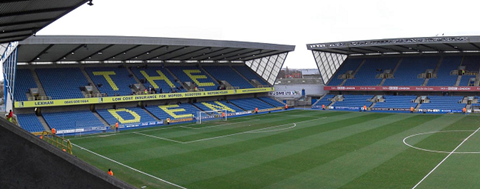
Malik dismisses the club’s threat to leave the area as scaremongering, but the club firmly rejects this claim.
“If the CPO goes through, we will explore other options,” says Kavanagh. “It’s not scaremongering; it’s good business. If I’ve got a motorway built in front of my house, am I going to move home? It’s our choice.”
If I’ve got a motorway built in front of my house, am I going to move home? It’s our choice - Steve Kavanagh, Millwall FC
The club has also expressed concerns over the nature of Renewal’s relationship with Lewisham council due to Malik’s and Dave Sullivan’s former ties to the local authority - Sullivan is the ex-mayor of Lewisham and co-founder of ServiceTeam and Renewal.
However, Malik denies any suggestions of impropriety. “We never did business with them,” he says of the council.
“All these rumours about me and Lewisham are absolute nonsense. People say: ‘You’re connected to them.’ But I left 22 years ago. Yes, some of those people are still there, but I went off and formed a company that provided public sector services in the private sector and we had contracts with probably 70 local authorities up and down the country, employing 5,000 people.”
While Sullivan joined Renewal after stepping down as mayor of Lewisham in the early 2000s, he only worked for him “for a short period of time, on small projects”, he adds.
“Sullivan never had anything to do with this project,” he insists. “He left and resigned [in 2007] before we really got into any kind of meeting and planning [with the council] in 2008.”
‘Vision & drive’
In a statement to Property Week, Sullivan denies any wrongdoing. “After leaving the council in 2002, I worked with Mushtaq Malik on a number of property development projects under the Renewal name,” he says.
“Within a short space of time, it became apparent that Mushtaq’s vision and drive [which was to deliver thousands of new homes, new employment opportunities for local people and new transport links] was beyond that of my own ambitions.
“I decided it was time to move on and start my own projects. I had an amicable break from Renewal, selling all my shares to Mushtaq Malik during 2005 and 2006 and formally resigning from all Renewal directorships in August 2007. I have remained friends with Mushtaq ever since and have closely followed the development plans over the years.”
Another issue that has been flagged up by opponents of the scheme is who actually owns Renewal. The main company is registered offshore, in the British Virgin Islands.
When asked to explain the ownership structure, Malik says it has two shareholders. “One is my family trust, which was established by my parents with their assets and money that doesn’t come from this country. The only other entity is a charity: the Jack Petchey Foundation. These are the only ones - we have nobody else.”
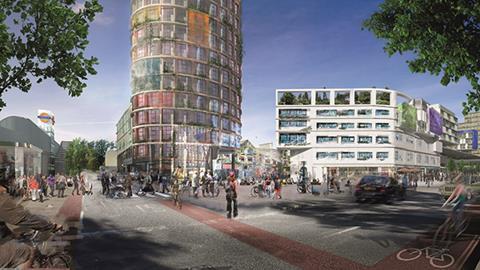
Property Week tried to make contact with Petchey for comment, but was unsuccessful. As for the reason behind registering the company offshore, Malik replies: “You would need to ask my mother. My parents set up the family trust for the benefit of their children. They didn’t know where their children were going to live, so they created an entity where any of us can go and live anywhere.”
Malik says he was introduced to Renewal’s other shareholder, the Jack Petchey Foundation, through mutual contacts. “We were looking for an external investor some time ago,” he explains. “I looked at several and I couldn’t work with some of them. This to me is a personal legacy. A normal investor wants a return, quick and fast, and I didn’t want to do that.
“If I wanted to do that I’d be much better buying parcels and selling them off. Renewal owns all the land and it has two shareholders. We are the people who deliver the project and they [the foundation] are the passive investor.”
But given one of the major recurring criticisms of Renewal’s planning application was the developer’s seeming lack of experience delivering large-scale property schemes, why not use Petchey’s name? “They preferred not to,” says Malik. “They’re not in it for the front end - they don’t want the high profile. We run the show - it’s our project, my dream, my vision. That’s their agreement with us.”
Malik admits Renewal has made some mistakes during the application process, the worst of which was stating it had “secured” £2m of funds from Sport England for the Surrey Canal Sports Foundation, a charity set up by Renewal to develop a £40m sports facility within the development.
Bone of contention
Malik showed Property Week a letter from 2013 in which Sport England’s property director, Charles Johnston, declared that “the committee has agreed for the project to move to our new fund with the existing £2m lottery funding allocation retained”. In the letter, Sport England said it would “continue to work together [with Renewal] to bring this important scheme to fruition”.
However, as Renewal was not ready to go ahead with the development due to delays caused by the CPO process, it never received the allocated funds. This became a bone of contention after national press reports revealed that Renewal no longer had a funding agreement with Sport England.

The council’s decision to stall on pushing through the CPO came shortly after with Lewisham mayor Sir Steve Bullock declaring that “the compulsory purchase order should not proceed”.
Malik says he welcomes the council’s inquiry into the scheme. “Lewisham council will launch an investigation and we want it to be high, wide and handsome. We want all this to come out - first, because the news about the Surrey Canal Sports Foundation is absolute rubbish, and second, the club is not under threat because they would have to move their academy.”
For the time being, all Renewal can do is wait for the council’s investigation to conclude, which could take months. So what if Lewisham rules against Renewal and decides to cancel the CPO?
“Well, then we’ll appeal to a higher authority,” says Malik. “And a higher authority and a higher authority. And we’ll say that we’re sitting here, owning 96%-plus of the land and we have a contractual agreement with the council on their freeholds, and these 2,500 homes and these 2,000 jobs and a brand-new station are being held up. For what? We will do whatever is necessary.”
However, the football club also says that it has no intention of giving up the fight.
“We’re a community asset and we’re there for a reason,” says Kavanagh. “We deliver £7m of benefits to serve the community and we deliver huge change to this area. Football itself is the embodiment of what this community is.
“That’s what Lewisham needs. That’s why we were given that lease [to the stadium, and associated land] in the first place. Why should it just be taken from us?”
Malik has not completely given up hope of reaching a compromise. “We will try to seek accommodation and welcome a reasonable response from the American owners of the club. But you can’t stop this.
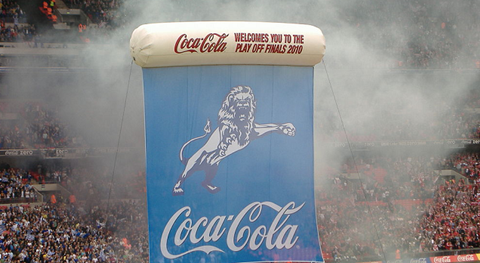
“The Bakerloo line extension is coming through here. The reason you can’t stop this is because of proximity to that.”
Malik points at the City through the boardroom window. “The sheer volume of money moving into this area is phenomenal.”
For now, this “virgin land” - as Malik describes it - is far from phenomenal. It’s just a decaying landscape of rusty sheds and brownfield land with, in the middle of it all, the elephant in the room, the 20,000-seat Millwall FC stadium.
Note - This article has been amended on 28 March 2017, a previous version stated the amount of one of the units onsite was worth “maybe £20,000” rather than “maybe £60,000”. The figure has been amended at the request of Renewal.
























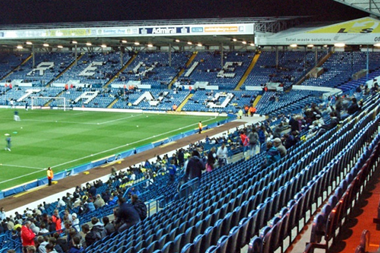
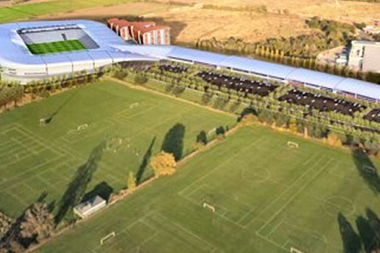



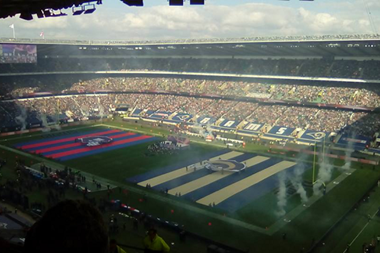
1 Readers' comment